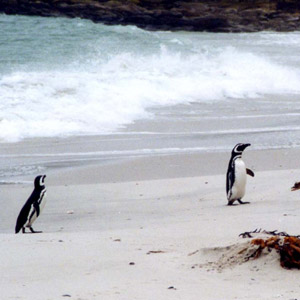Magazine | Analyses
A propos des Manchots de Magellan qui s’échouent au Brésil

Manchots de Magellan (Spheniscus magellanicus).Photographie : Stan Shebs / Wikimedia Commons
Introduction
530 Manchots de Magellan (Spheniscus magellanicus) ont été trouvés pendant 15 jours au mois de juillet 2010 sur les plages de Peruibe, de Praia Grande et d’Itanhaem dans l’état de São Paulo, dans le sud de Brésil. L’épuisement et le manque de nourriture seraient les causes de cette situation; en effet les manchots effectuent actuellement leur migration vers le Nord à partir des colonies de Patagonie et des Malouines.
Un brusque changement de la température des eaux serait aussi impliqué.
S’il est classique que des manchots s’égarent sur les côtes brésiliennes lors de leur migration, jamais un chiffre aussi élevé n’avait été atteint.
Nous vous proposons une présentation de cette espèce et des principales causes de mortalité de l’espèce.
Abstract
Hundreds of dead Magellanic Penguins and other sea animals have washed up on the shores of Sao Paulo state and scientists are investigating the causes. Five hundred and thirty penguins, numerous other sea birds, five dolphins and three giant sea turtles have been found during 10 days in July 2010 in the coastal towns of Peruibe, Praia Grande and Itanhaem. The penguin deaths are most likely due to exhaustion and hunger caused by their long migration from the waters off Argentina’s southern Patagonia region. It’s common that some penguins get lost along their way or die from hunger or exhaustion, and end up on the Brazilian coast far from home, but not in such numbers : about 100 to 150 live penguins show up on the Brazilian beacheas in an average year, and only 10 or so are dead.
We present you this species that was once abundant along the Patagonian coasts of Argentina, Chile and Falklands, but which is now classified as « near threatened ».
Poursuivez la lecture de cet article, en vous abonnant dès maintenant !
Découvrez les Archives d’Ornithomedia.com
Pour seulement 10,00 €TTC/an (ou 6,00 € les 6 mois)
Profitez de plusieurs centaines d’articles en accès illimité et sans aucun engagement.
Compléments
Ouvrages recommandés
- Birds of Chile: Including the Antartic Peninsular, the Falkland Islands and South Georgia de Alvaro Jaramillo (Auteur), Peter Burke (Illustrations), David Beadle (Illustrations)
- Guia De Aves Y Mamiferos De La Patagonia/ Birds And Mammals Guide Of The Patagonian Coast de Guillermo Harris (Auteur)
Sources
- Penguins Sentinels. Help Us Track Penguins. http://mesh.biology.washington.edu/penguinProject/VIP
- PÜTZ Klemens, SCHIAVINI Adrian, RAYA KEY Andrea, LÜTHI Benno H. (2007). Winter migration of magellanic penguins (Spheniscus magellanicus) from the southernmost distributional range. Marine biology. Volume 152, numéro 6, pages 1227-1235. http://cat.inist.fr/?aModele=afficheN&cpsidt=19189074
- Falklandsconservation.com. Starving Falkland Penguins. http://www.falklandsconservation.com/news/pre2008/starving_pengs.html
- Sandra Carvalho Rodrigues, Andréa Corrado AdornesII, Euclydes Antônio dos Santos FilhoI, Rodolfo Pinho Silva FilhoII, Elton Pinto ColaresI (2010). Surviving probability indicators of landing juvenile magellanic penguins arriving along the southern Brazilian coast.Brazilian Archives of Biology and Technology. Volume 53. http://www.scielo.br/scielo.php?pid=S1516-89132010000200021&script=sci_arttext
- Photovolcanica.com. Magellanic Penguin. http://www.photovolcanica.com
- Zoologico de Sao Paulo. PINGUINS-DE-MAGALHÃES. http://www.zoologico.sp.gov.br/aves/pinguim_magalhaes.htm
- Tavares T. L. et Nascimento M.S. (2009). REGISTROS DE SPHENISCUS MAGELLANICUS (FORSTER 1781) (AVES: SPHENISCIFORMES) NO ANO DE 2008 ENTRE PRATIGI, ITUBERA – BA A RIO DE CONTAS, ITACARE – BA. Anais do IX Congresso de Ecologia do Brasil. http://www.seb-ecologia.org.br/2009/resumos_ixceb/1208.pdf
- AFP (2010). Cem pinguins sujos de petróleo chegam à costa uruguaia.
- Estadao.com.br (2010). Em 15 dias, mais de 500 pinguins mortos no litoral de SP. http://www.estadao.com.br/noticias/vidae,em-15-dias-mais-de-500-pinguins-mortos-no-litoral-de-sp,584821,0.htm




Aucun commentaire sur ce sujet
Participer à la discussion !